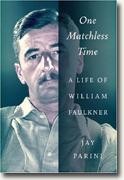Jay Parini
book reviews:
· general fiction
· chick lit/romance
· sci-fi/fantasy
· graphic novels
· nonfiction
· audio books
· author interviews
· children's books @
curledupkids.com
· DVD reviews @
curledupdvd.com
newsletter
win books
buy online
links
home
for authors
& publishers
for reviewers

 |
One Matchless Time: A Life of William Faulkner Jay Parini HarperCollins Hardcover 512 pages November 2004 |
|
The most captivating and yet disturbing story that William Faulkner ever created is the one Jay Parini has penned: One Matchless Time: A Life of William Faulkner.
Of course, Faulkner has provided Parini with more than sixty years of material to work with for this book. While Parini is obviously captivated by his subject, he has done an outstanding job of presenting both the bright and dark of William Faulkner's life. Faulkner was the epitome of the struggling tortured writer, and one comes away with both a concern about the self-destructive choices the Nobel Laureate and Pulitzer Prize winner was making and with a the nagging question as to whether it was all a part of the underlying theme necessary to make ensuing works of his life read well. I came away with the feeling that Faulkner was more in control of his tragic circumstances than others of his time may have believed. Based upon Parini's examination of Faulkner's decision-making, it seems unlikely that a man so much in control one second would simply so utterly self-destruct the next, even given what we know today about alcohol addiction. Faulkner showed an ability to control his behaviors when it suited him or would allow him to achieve a desired outcome. As Parini pointed out, Faulkner consciously created the illusion he wanted others to have of him in his younger days. Did he mature out of that, or were the subsequent missteps part of an even grander and more refined illusion? Faulkner's teeterboard life is disturbing on several points. While Faulkner as an author tended to disregard the overly romantic and bring to the forefront the baser tendencies of human nature within his writings, he seemed wholly wedded to the romanticism that has always surrounded the writing life. He even seems to have gone to great lengths to perpetuate that romanticism through his liaisons with young women who were equally smitten with the notion of the literary figure he embodied. Faulkner's was a typical love-hate relationship with writing, though I think a conscious one - hating the uncertainty of it while simultaneously thriving on that uncertainty. For Faulkner, the rewards were, in equal parts, monetary gain and notoriety. Unlike Parini, however, I do not have the impression that Faulkner had a change of heart in later life with regard to being a public figure. I am left with the impression that he always welcomed the very notoriety he outwardly rejected. Like all good businessmen, he created a demand for his product - himself, his opinions, his interpretations - by denying the very thing that was desired: accessibility to the great man. It is not surprising that when his fame had peaked and seemed about to begin a natural declination, Faulkner began granting interviews, giving lectures, and accepting teaching and travel offers. Faulkner's life does not read like a life of reckless abandon. It reads like a well-controlled literary experiment. It is interesting to note, however, that Faulkner continued to resist requests from those who sought from him interpretations of his own works. Was it that he wanted them to think for themselves? Or was it that he, like many of his readers, couldn't fully interpret them? I haven't had the pleasure of reading Jay Parini's other books and essays, but I am inclined to do so after reading this. I am even inclined to reread Faulkner to see whether I see in his work what Parini has seen there. Likewise, I would recommend that anyone undertaking a more in-depth study of Faulkner read One Matchless Time before they do so. Parini's insights and the background of Faulkner himself will be of inestimable value in discerning Faulkner's intended, or even unintended, purpose behind the words. © 2005 by Susan Cronk for curledup.com. |
|
|
|
 Click here to learn more about this month's sponsor! |
|
| fiction · sf/f · comic books · nonfiction · audio newsletter · free book contest · buy books online review index · links · · authors & publishers reviewers |
|
| site by ELBO Computing Resources, Inc. | |
 Jay Parini knows his subject extremely well - that is evidenced by the detailed insights the author shares within the body of this work, and the in-depth perspective he has on the individual works of William Faulkner. One would expect that a biographer would get to know his subject, but far too few today dig as deeply. This is a thrillingly hulking work that casts a wide shadow over the decade-by-decade shavings that comprise biographies of self-proclaimed notables today - works that often seem written with short attention spans in mind. Parini is a masterful writer. His style makes the 492 pages of One Matchless Time a beneficial use of one's time and a substantial exercise for the mind.
Jay Parini knows his subject extremely well - that is evidenced by the detailed insights the author shares within the body of this work, and the in-depth perspective he has on the individual works of William Faulkner. One would expect that a biographer would get to know his subject, but far too few today dig as deeply. This is a thrillingly hulking work that casts a wide shadow over the decade-by-decade shavings that comprise biographies of self-proclaimed notables today - works that often seem written with short attention spans in mind. Parini is a masterful writer. His style makes the 492 pages of One Matchless Time a beneficial use of one's time and a substantial exercise for the mind.